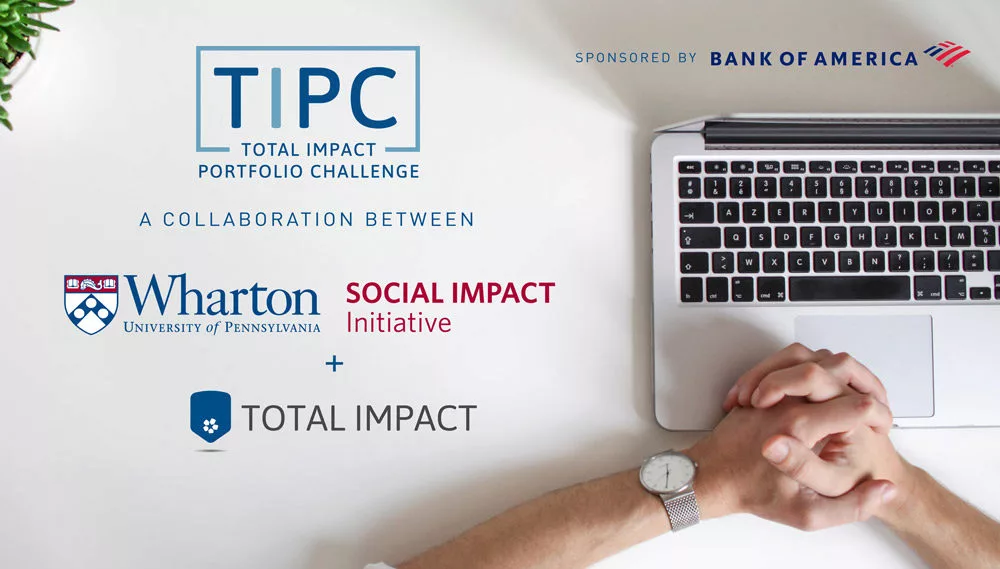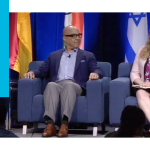This article was originally published by Wharton Social Impact Initiative. Learn more about the challenge on the Total Impact Portfolio Challenge website. You can also review the winning teams from the 2021 Total Impact Portfolio Challenge here.
If you think impact investing is just for the venture capital space, think again. Increasingly, institutional investors are seeking to maximize impact across asset classes: venture capital, public equities, fixed income, alternatives, and more. Enter the Total Impact Portfolio Challenge (TIPC).
Now in its fourth year, TIPC is a year-long, graduate student impact investing competition produced in collaboration with Wharton Social Impact Initiative and SOCAP Global. Students gain knowledge and experience in designing investment portfolios that embed impact into overall strategic asset allocation.
Each year the program invites student teams to put theory into practice to create a “100% impact portfolio” for a hypothetical client. This year’s client was a fictitious $250 million university endowment with a focus on tackling climate change and income equality. The student teams were tasked with building a portfolio and demonstrating how the portfolio meets the endowment’s impact goals, financial return goals, target asset allocation, and risk tolerance.
The 2021–2022 program received applications from university teams across the U.S., including the University of North Carolina at Chapel Hill, the University of Colorado, the University of Southern California, and the University of Maryland. Students spent the academic year identifying specific securities, funds, and investments to include in their client’s portfolio. They submitted their final portfolio as well as a clearly communicated strategy detailing their approach in early March. Finalists were selected in late March and invited to present their pitch at the final competition.
2022 TIPC Finals
For the third year in a row, the competition finals were virtual, inviting viewers from around the world to tune in live. Attendees included students, industry practitioners, and academics.
“We were pleased to see a range of approaches students took to design their portfolios this year,” said Yuri Seung, program manager at Wharton Social Impact. “It’s at the finals where students can showcase their strategies and act as if they are financial advisors. Our judges, who assume the role of their client, really dig into each team’s decisions to ensure their portfolios align with their long-term goals. We were impressed with how well the students presented and defended their strategies during the Q&A.”
Of the four finalist teams, two were from Bard College, and one each was from Fordham University and the University of Chicago Booth School of Business. The finalist teams’ submissions showed creativity and demonstrated a rigorous, methodical approach to portfolio construction.
Winner: Bard MBA in Sustainability Program
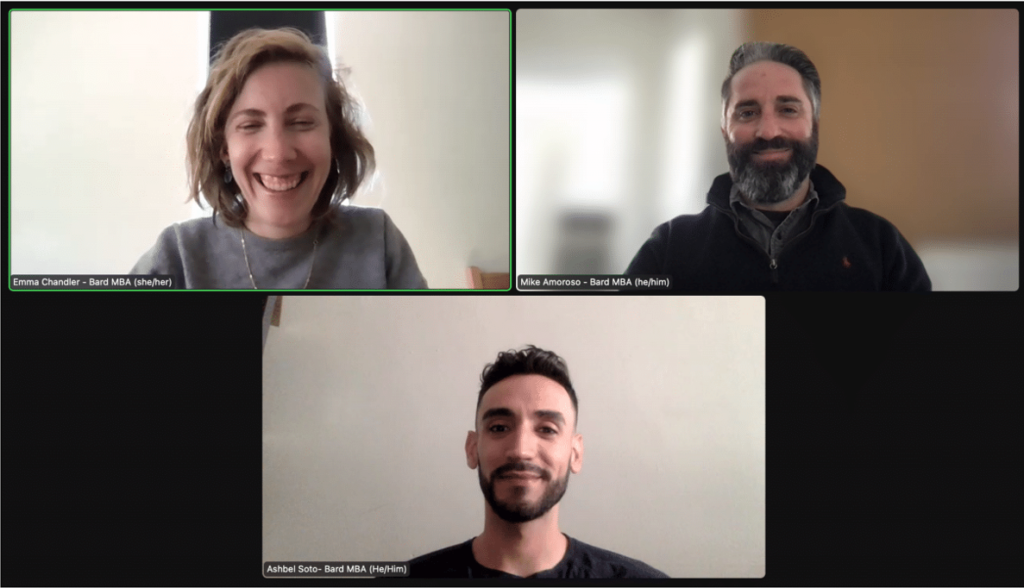
Michael Amoroso, Emma Chandler, and Ashbel Soto from the Bard MBA in Sustainability program won the competition with a portfolio that aimed to achieve “maximum returns and maximum measurable impact in alignment with our client’s goals and values and our mission to lead the change towards shared well-being on a healthy planet.”
“Our approach was to seek out broad diversification across asset classes and objectives that would allow us to advance the client’s goal to help mitigate climate change,” said the Bard team. This included investing in funds that advance solutions and the just transition to a low-carbon economy. Since our client is a mission-driven educational institution, we also felt it was important to consider how the community could participate from an active ownership perspective, and for students, how this could aid learning and career advancement opportunities.”
They added, “To achieve the greatest impact, we took into consideration that environmental and social equity issues are inextricably linked, focused on measurable impact that can be transparently shared and reported, and leveraged engagement as a tool for driving change.”
Runner-Up: University of Chicago Booth School of Business
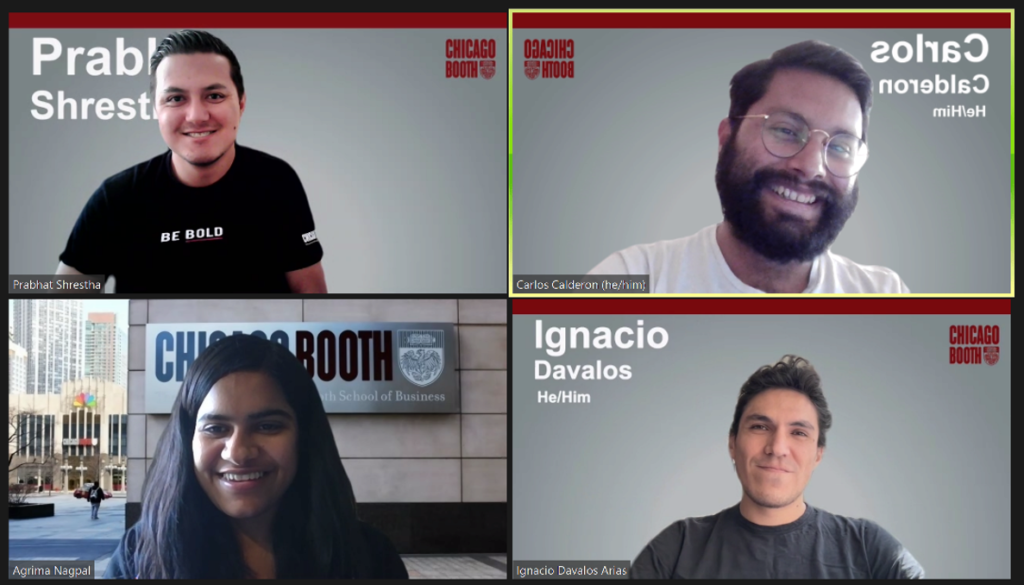
Carlos Calderon, German Ignacio Davalos, Agrima Nagpal, Prabhat Shrestha from the University of Chicago Booth School of Business were the runner-up team. Reflecting on how they approached structuring their portfolio they said, “First, we determined the asset allocation through a risk-return optimization. Second, a thoughtful screening and due diligence for fund selection considering key variables as performance, impact focus, mission alignment and fee structure.”
“To achieve the greatest impact, we believe portfolio managers must be intentional as they source opportunities to align their investments with the organization’s mission and purpose, while enhancing risk-adjusted returns.” They echoed the Bard team saying, “Impact investing is a powerful tool for change.”
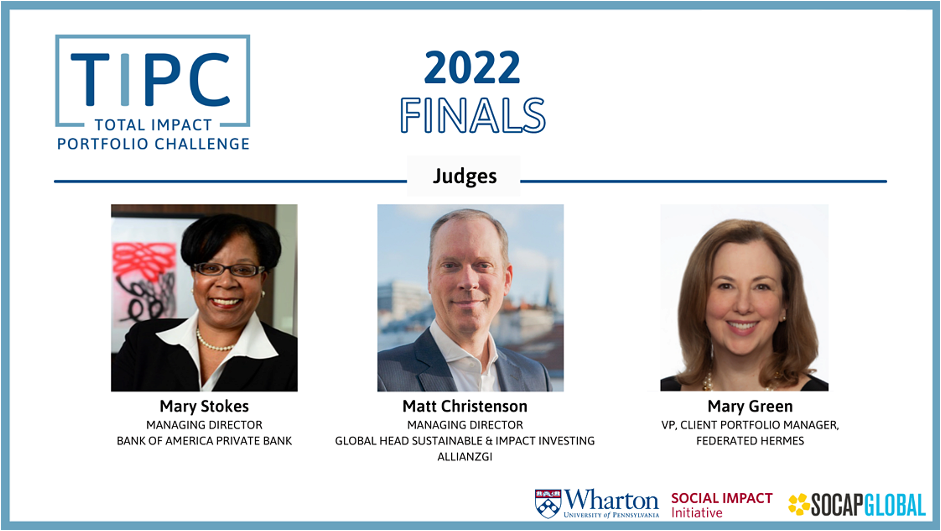
Judges for the 2022 competition were Mary Stokes (Managing Director, Bank of America Private Bank), Matt Christensen (Managing Director and Global Head Sustainable & Impact Investing, Allianz Global Investors), and Mary Green (Vice President, Client Portfolio Manager, Federated Hermes). Following each presentation, the judges engaged with the student team for a detailed question and answer session, simulating the experience of a presentation with feedback from clients. The students appreciated the judges’ comments that offered valuable insights into how institutional investors think about impact investing portfolios.
Total impact Portfolio Challenge Guidance from Bank of America
Throughout the year, over 70 volunteers from Bank of America — wealth advisors, analysts, portfolio managers, and sustainability experts — served as coaches to Total Impact Portfolio Challenge teams. They provided guidance to students as they worked through the program and built their investment portfolios for the illustrative family foundation.
“This year’s outstanding coach and student participation illustrate the rapidly evolving role of sustainable investing in investment management, resonating not just with future generation investors, but the current generation,” said Mary Stokes, Institutional Market Investment Executive at Bank of America Private Bank and one of the lead judges.
“The professional expertise of our BofA coaches proved to be invaluable,” the Fordham team said. “Our team met with our coaches and had lengthy insightful conversations about the importance of impact investing and how portfolios are managed in the real world. Their guidance and objective criticism assisted the process of building an impact portfolio.”
Other Industry Resources for Students
Not all asset classes offer easy-to-find, investable opportunities. Students were encouraged to be creative in their approach and definition of impact.
Luckily, they also had a set of industry resources to help them look for investment opportunities. Earlier this year, Anna Snider, the Managing Director and Head of Due Diligence for the Chief Investment Office within Global Wealth & Investment Management of Merrill and Bank of America, hosted a webinar for TIPC students on the topic of selecting fund managers in public markets. Additionally, Kristin Hull, founder and CEO of Nia Impact Capital discussed the evolution of impact investing in public equities in another webinar. Net Impact, Wharton Research Data Services (WRDS), Toniic, Arabesque, Commonfund Institute, and Align Impact served as content contributors and supported students through networking, investment tools, webinars, and case studies.
“At a time when organizations consider Sustainable Development Goals and impact as an integral part of their business, and not just as a niche market to please a subsection of investors, it is of utmost importance that the next generation of asset managers gains tangible experience with responsible investments strategies and enter the job market fully fluent in the impact investing ecosystem,” said Fabienne Blanc, Community and Operations Manager at SOCAP Global.
The TIPC competition will return next academic year, and all graduate students interested in participating will be able to apply in August.
A special thank you to Bank of America and Federated Hermes for sponsoring TIPC and to Net Impact for helping spread the word about the program across campuses nationwide.
